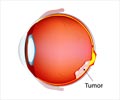Children from racial and ethnic minority families who do not have private health insurance have to undergo a more invasive treatment.

Retinoblastomas are tumors that develop during childhood in the light-sensitive retina at the back of the eye. There are about 350 new cases diagnosed each year in the United States. Treatment may require surgical removal of the affected eye and, if the disease is likely to spread, follow-up chemotherapy.
"The longer that retinoblastomas grow before they're diagnosed and treated, the more invasive they become," said the study's lead author, Adam Green, MD, of DF/CHCC. "In this study, we used tumor invasiveness as an indicator of delays in disease diagnosis."
Data and tumor tissue used in the study came from pediatric retinoblastoma patients participating in a clinical trial run by the Children's Oncology Group, a consortium of more than 8,000 childhood cancer experts on three continents. All the patients had the diseased eye surgically removed, and those whose disease was deemed likely to spread received chemotherapy.
Investigators collected data on patients' insurance status, race, and ethnicity. The tumor tissue samples were examined by pathologists for signs that the tumors would metastasize.
"We correlated the demographic data with the results of the pathology exams to see if children with retinoblastoma who were non-white, Hispanic, or who did not have private health insurance were more likely to have disease invasiveness at diagnosis requiring chemotherapy in addition to surgery, a stage of disease that may carry a lower survival rate," Green said. "The answer was yes."
"We now need to find out where in the diagnostic process the delays are occurring," said the senior author of the study, Carlos Rodriguez-Galindo, MD, of DF/CHCC. "Is it because patients' families aren't familiar with the warning signs of the disease, because they have trouble getting to a primary care doctor or ophthalmologist for an exam, or some other factor? We hope to explore those questions in future studies."
Source-Eurekalert
 MEDINDIA
MEDINDIA




 Email
Email










